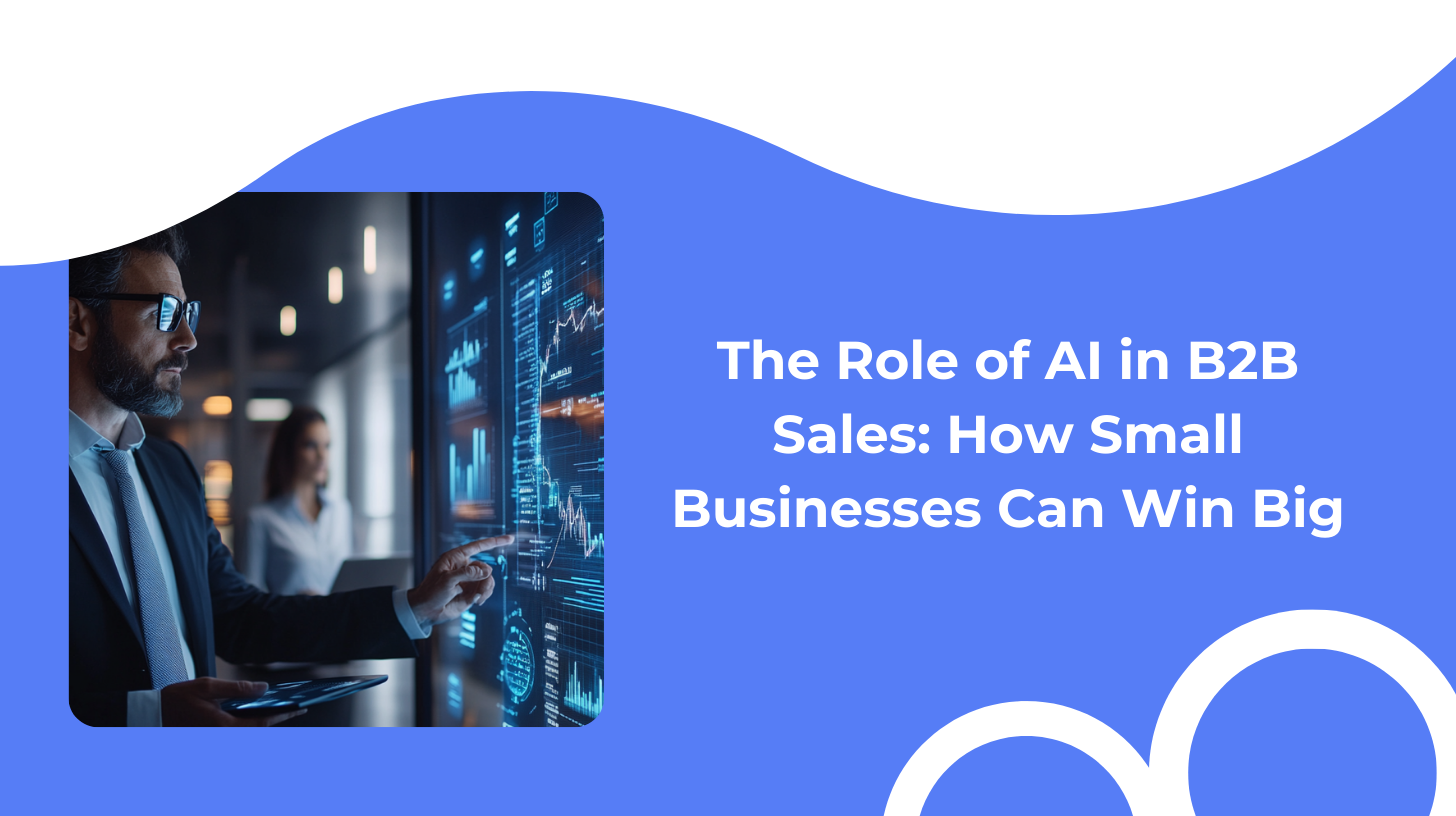- 1. A Small Business in the B2B Sales Arena: A Familiar Story
- 2. The B2B Sales Battlefield: David vs. Goliath
- 3. AI’s Role in B2B Sales: How Small Businesses Can Compete
- 4. A Small Business Winning with AI: Success Story
- 5. Busting Myths About AI in B2B Sales
- 6. How Small Businesses Can Start Using AI Today
- 7. Time for Small Businesses to Act
The Role of AI in B2B Sales: How Small Businesses Can Win Big

A Small Business in the B2B Sales Arena: A Familiar Story
Imagine a small consulting firm with a tiny sales team. Every day, they juggle cold emails, LinkedIn outreach, and follow-ups, struggling to keep up with leads. Meanwhile, a corporate competitor floods the market with sales reps, automation, and expensive CRM tools. The small firm’s response time is slower, their lead nurturing inconsistent, and they often lose deals simply because they can’t engage prospects fast enough.
This is the reality of many small B2B companies. But AI is changing the game, allowing smaller businesses to operate like large-scale sales machines—without hiring an army of salespeople.
The B2B Sales Battlefield: David vs. Goliath
B2B sales have become increasingly competitive, and small businesses face major challenges:
- Limited resources: Small teams handling lead generation, qualification, and follow-ups manually.
- Slow response times: Big competitors engage leads instantly, while small teams struggle to keep up.
- Lack of data-driven decision-making: Without AI-driven insights, small businesses miss key sales opportunities.
- High customer acquisition costs: Inefficient processes lead to wasted ad spend and lost leads.
Large companies leverage automation, AI-powered CRM tools, and multi-touch sales sequences at scale. Small businesses, however, traditionally lacked the tools to compete. That’s where AI Sales Managers come in.
AI’s Role in B2B Sales: How Small Businesses Can Compete
AI doesn’t replace human sales teams—it amplifies their effectiveness. Instead of cold calling and chasing unqualified leads, small businesses can use AI to optimize every stage of the B2B sales funnel.
Lead Scoring & Qualification in Minutes, Not Days
AI Sales Managers analyze incoming leads, prioritize the most valuable ones, and route them to the right sales rep—automatically.
A B2B software startup implemented AI-driven lead qualification and reduced response time from 24 hours to under 5 minutes. The result? A 2x increase in demo bookings and a 30% higher close rate.
Hyper-Personalized Outreach at Scale
AI Sales Managers generate personalized email sequences based on customer data. No more generic sales pitches—AI adapts messaging dynamically.
A consulting firm using AI-powered outreach saw open rates jump from 18% to 42% because the AI crafted emails based on past customer interactions.
Instant Follow-ups Without Human Delays
Speed matters in B2B sales. AI ensures no lead is ignored by sending intelligent follow-ups at the right time, increasing engagement.
A logistics company automated their follow-ups with an AI Sales Manager and recovered 15% more leads that would have otherwise gone cold.
CRM Data Enrichment & Sales Forecasting
AI automatically updates customer profiles, tracks interactions, and predicts which leads are likely to convert. This prevents wasted time on low-quality leads.
A Small Business Winning with AI: Success Story
A 5-person consulting firm was struggling with lead management. They had a long sales cycle, often losing deals due to delayed responses. After implementing an AI Sales Manager, they saw:
- A 3x increase in scheduled meetings without additional sales hires.
- A 40% reduction in manual follow-ups, freeing time for high-value client interactions.
- A deal cycle shortened from two months to three weeks.
AI allowed them to act like a company with a full-fledged sales department—without the extra costs.
Busting Myths About AI in B2B Sales
💡 Myth: AI is only useful for B2C.
✅ Reality: AI is perfect for complex, multi-touch B2B cycles where personalization and follow-ups are crucial.
💡 Myth: AI replaces human salespeople.
✅ Reality: AI handles time-consuming tasks, allowing sales teams to focus on high-value conversations and closing deals.
💡 Myth: AI is expensive and complicated.
✅ Reality: Many AI Sales Managers cost a fraction of a full-time salesperson and integrate seamlessly into existing workflows.
How Small Businesses Can Start Using AI Today
Unlike large corporations with dedicated IT teams, small businesses need practical, easy-to-implement AI solutions. Here’s how to get started:
Step 1: Identify Sales Bottlenecks
- Are leads slipping through the cracks?
- Are follow-ups inconsistent?
- Are your salespeople spending more time on admin tasks than closing deals?
Pinpoint where AI can provide the most impact.
Step 2: Implement an AI Sales Manager on One Channel
- Start small—add AI-powered engagement to your website, email sequences, or LinkedIn outreach.
- Ensure AI integrates with your existing CRM for seamless lead tracking.
Step 3: Iterate & Expand
- Monitor results: How many leads are engaged? How much time is saved?
- Adjust scripts, data inputs, and response strategies to maximize performance.
- Gradually integrate AI into other parts of the sales process (e.g., lead qualification, nurturing, and reporting). Why Now Is the Best
Time for Small Businesses to Act
B2B sales are evolving fast. Companies that adopt AI now will gain a competitive advantage, while those that wait risk being left behind. AI-powered sales tools are no longer exclusive to enterprise businesses—they are affordable, easy to integrate, and highly effective for small teams.
🚀 The key takeaway? Small businesses that embrace AI will operate with the speed, intelligence, and efficiency of large-scale sales teams—without the massive overhead.
Ready to explore how an AI Sales Manager can transform your B2B sales? Book a free demo and start closing more deals today.

9 min for reading


